Welcome to the thrilling world of hunting in North Carolina! This state is a paradise for hunters with its two distinct regions – from stunning Atlantic Ocean beaches to the majestic Appalachian Mountains.
With an abundance of wildlife, this destination has something for everyone: experienced hunters can challenge themselves and beginners can have their first memorable experience. From deer and turkey to waterfowl and small game, you’re sure to find the perfect quest here.
In this comprehensive guide, we have covered all you need to know about hunting in North Carolina. Whether you want to know what type of animals can be hunted here, what are the best places to find them, hunting seasons, and license information, you will get all the answers right here.
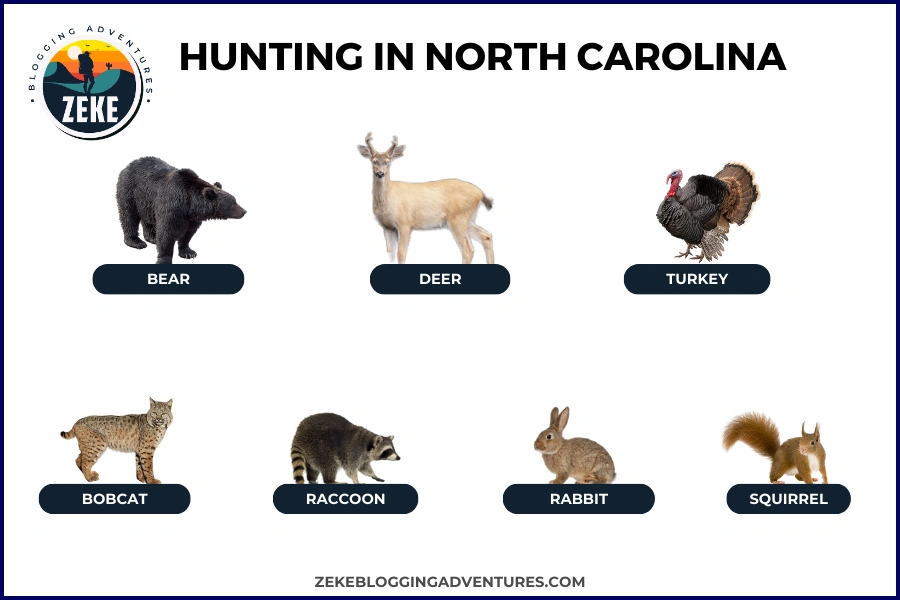
What Can You Hunt in North Carolina?
North Carolina is home to a plethora of wildlife, including white-tailed deer, black bears, and wild turkeys which can be easily found across the state. For those who enjoy small game hunting, squirrels, rabbits, quail, and doves are just some of the species that can be hunted in this area.
Waterfowl like ducks and geese are also abundant during their migration period along NC coasts. If you’re looking for something more challenging then look no further – coyotes and feral hogs roam free all year round without any bag limits or closed season.
Deer
Deer is the most hunted animal in the state of North Carolina. When picking your hunting destination in NC, you’ll have a range of landscapes to choose from. Mountainous forests or open fields in the Piedmont region provide great opportunities for both bow and rifle hunters.
It’s essential to do some scouting before getting started – look for deer tracks, rubs, scrapes, etc. Investing in quality gear is incredibly important too; make sure you feel comfortable with whatever weapon you use and camouflage clothing can help blend into your surroundings and give yourself an edge against the animals.
Be aware that different species of deer have varying guidelines during certain seasons throughout the year – always check local wildlife resources before setting out on a hunt.
During mid-October through early November, there’s also a unique rutting season in which bucks are actively searching for does – calls or scents can be effective here but should be used responsibly. Also, never forget about safety, tell someone where you’re going and when they can expect your return home.
Deer Season North Carolina
| Season | Dates | Hunt Method |
| Northeastern and Southeastern Antlered Deer | Sep 09 – Sep 29 | Archery |
| Northeastern and Southeastern Antlered Deer | Sep 30 – Oct 13 | Blackpowder |
| Northeastern and Southeastern Antlered Deer | Oct 14 – Jan 01 | Gun |
| Central Antlered Deer | Sep 09 – Oct 27 | Archery |
| Central Antlered Deer | Oct 28 – Nov 10 | Blackpowder |
| Central Antlered Deer | Nov 11 – Jan 01 | Gun |
| Northwestern Antlered Deer | Sep 09 – Nov 03 | Archery |
| Northwestern Antlered Deer | Nov 04 – Nov 17 | Blackpowder |
| Northwestern Antlered Deer | Nov 18 – Jan 01 | Gun |
| Western Antlered Deer | Sep 09 – Oct 01, Oct 15 – Nov 19 | Archery |
| Western Antlered Deer | Oct 02 – Oct 14 | Blackpowder |
| Western Antlered Deer | Nov 20 – Dec 09 | Gun |
| Western Antlered Deer | Dec 10 – Jan 01 | Archery (Antlered only) |
| Youth Hunt Day | Sep 23 | Any Legal Weapon |
Bear
There is no greater thrill than hunting bears. Before going on your adventure, it’s important to obtain the necessary licenses and permits from the NC Wildlife Resources Commission so you can hunt with confidence.
Gear up for success by getting yourself an accurate rifle or bow that meets the state regulations. Also, make sure to have protective items such as bear spray or sidearms at hand in case of any aggressive encounters.
When tracking bears, stealthy movement is key – stay downwind and quiet while looking out for signs like tracks, scat, claw marks on trees, etc. to locate them better. Baiting is also a great strategy – set up bait sites where bears are known to frequent then wait patiently until you get the perfect shot opportunity!
Spot-and-stalk hunting works too; scan from afar before carefully maneuvering through terrain closer for clean shots using natural features around you as cover.
Safety should always be a top priority when hunting these majestic creatures. Never go alone; bring friends along who can watch each other’s backs throughout this wild journey.
Bear Season in North Carolina
| Season | Dates |
| Mountain Bear Season | 16 Oct – 18 Nov, 11 Dec – 01 Jan |
| Piedmont Bear Season | 14 Oct – 01 Jan , 11 Jan – 01 Jan, 18 Nov – 01 Jan |
| Coastal Bear Season (Zone 01) | 11 Nov – 26 Nov, 09 Dec – 24 Dec |
| Coastal Bear Season (Zone 02) | 11 Nov – 26 Nov, 09 Dec – 24 Dec |
| Coastal Bear Season (Zone 03) | 11 Nov – 26 Nov, 09 Dec – 24 Dec |
| Coastal Bear Season (Zone 04) | 18 Nov – 17 Dec |
| Coastal Bear Season (Zone 05) | 13 Nov – 01 Jan |
Turkey
North Carolina is an outdoor enthusiast’s paradise, offering a wealth of turkey hunting opportunities. With over 1.2 million acres of public land for hunting, you can easily find the perfect spot to bag that next gobbler while hunting in North Carolina.
When it comes to gear selection, choose wisely – opt for a shotgun with tight chokes, and don’t forget your camouflage clothing as turkeys have excellent eyesight.
Hunting tactics are equally important: consider using calls or decoys to draw them in closer within shooting range. When calling, try mimicking their natural vocalizations like clucks, purrs, and yelps; when setting up decoys ensure they’re strategically placed at just the right distance from you, use caution when approaching your setup.
Patience is also essential here so take your time; wild turkeys are smart creatures so be prepared, should things not pan out on one location or call attempt – switch it up if needed until success has been achieved.
Wild Turkey Season NC
| Season | Dates | Bag Limit |
| Spring Turkey Season | Apr 13 – 11 May | Beared Turkey only |
| Youth Turkey Hunt | Apr 06 – Apr 12 | Beared Turkey only |
Raccoon
Hunting raccoons is an exciting adventure for any hunter. First and foremost, let’s discuss the optimum time to hunt raccoons in North Carolina. These critters are most active during nighttime hours, so make sure you plan your outings accordingly – fall/winter seasons being ideal for their thickest fur coats.
When it comes to gear selection, a shotgun or .22 caliber rifle should do the trick. Don’t forget an essential like a flashlight or headlamp too! Camouflage clothing is also recommended as these furry creatures have sharp eyes, they’ll spot any misfit hunter quickly.
Once you’ve determined where raccoon activity is highest, look for signs such as tracks and scat around fields/forests/urban areas; since they’re omnivores after all.
To set up a successful hunting station: position yourself at least 20 yards away from potential food sources (try baiting with sweet-smelling fruits/corn) and use predator calls if needed – this will draw them nearer.
Finally, aim carefully when taking down one of these tricky mammals by aiming for either its head or chest area; ensuring that death is swift yet humane.
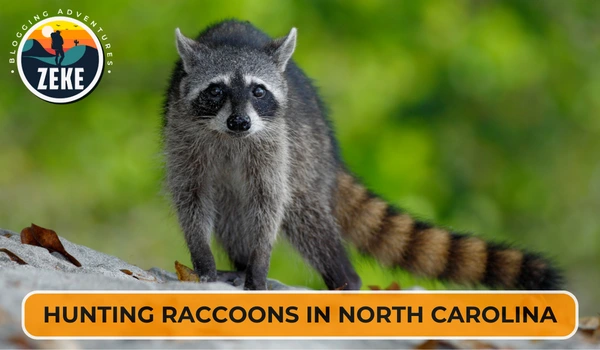
Raccoon Season
| Species | Dates | Bag Limit |
| Raccoon | Oct 16 – Feb 29 | 3 per day |
Squirrel
It’s time to get into the nitty-gritty of hunting squirrels in NC. To start, you’ll need a lightweight shotgun or .22 caliber rifle that is properly sighted in and fully stocked with ammo. Then it’s all about scouting out areas like nut-bearing trees, brush piles, or logs where these creatures might hide.
Patience is important when waiting for them to appear. Early morning and late afternoon are ideal times since they’re most active at those hours while foraging for food.
Once you’ve got your quarry lined up in your sights, remember to handle it carefully and respectfully – no matter how excited you may be! Proper cleaning techniques should also be followed after the hunt so as not only to maximize its meat but also to help maintain healthy forest growth by controlling populations responsibly.
Squirrel Season NC
| Species | Dates | Bag Limit |
| Fox Squirrel | Oct 16 – Jan 31 | 1 per day |
| Gray Squirrel (Private Land only) | May 13 – May 17 | 8 per day |
| Gray & Fox Squirrel | Oct 16 – Feb 29 | 8 per day |
Rabbit
Rabbit hunting is one of the most popular pastimes in Tarheel State. Make sure you have all the necessary licenses and permits before setting out on your hunt. In North Carolina, that means a small game license and a game lands privilege license for public land.
Now let’s talk gear: 12 or 20-gauge shotguns are ideal for rabbit hunting; however, .22 caliber rifles can also get the job done if sighted in correctly. Don’t forget ammo and appropriate clothing!
When looking for rabbits, focus on areas with thick brush like hedgerows, fence lines, or overgrown fields where they find refuge to hide and feed during morning/evening hours when they’re most active.
To flush them out of hiding spots, use either your hunting dog or predator calls mimicking an injured bunny noise (eek!). When shooting, aim directly towards their head/neck area which will result in a quick kill while avoiding unnecessary suffering – then retrieve those bunnies quickly before predators snatch ’em up!
As far as bag limits go in NC, there are none but take only what you need.
Rabbit Season NC
| Species | Dates | Bag Limit |
| Rabbit | Oct 16 – Feb 29 | No Limit |
Bobcat
Hunting bobcats in North Carolina is a thrilling challenge for experienced and novice hunters alike. To stay legal, you’ll need the proper tags and licenses before heading out into the wild.
Bobcats are most active during dawn and dusk, so it pays to plan your hunt accordingly if you want to increase your chances of success. Searching for signs like tracks or scat can help narrow down their location – but be prepared since they’re incredibly swift animals who take off at any sign of danger!
If possible, use predator calls as an effective way to lure them in range or hounds trained by skilled handlers which can tree them more easily. No matter what method you choose, patience will be key when hunting these agile felines.
Bobcat Season
| Species | Dates | Bag Limit |
| Bobcat | Oct 16 – Feb 29 | No Limit |
Coyote Season
| Species | Dates | Bag Limit |
| Coyote | Jan 01 – Dec 31 | No Limit |
Groundhog Season
| Species | Dates | Bag Limit |
| Groundhog | Jan 01 – Dec 31 | No Limit |
Skunk Season
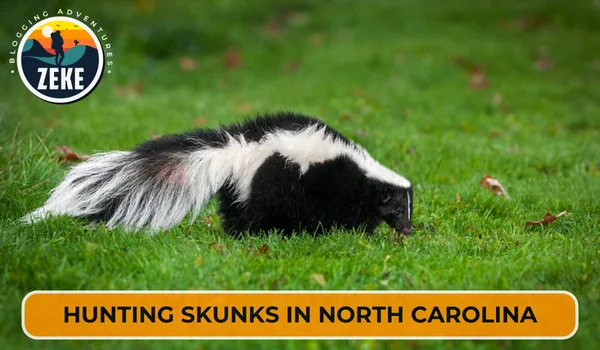
| Species | Dates | Bag Limit |
| Striped Skunk | Jan 01 – Dec 31 | No Limit |
Nutria Season
| Species | Dates | Bag Limit |
| Nutria | Jan 01 – Dec 31 | No Limit |
Fox Season
| Season | Dates | Bag Limit |
| Regular | Jan 01 – Dec 31 | No Limit |
| Specific Counties | Nov 18 – Jan 01 | 2 per day |
| Specific Counties | Jan 06 – Jan 27 | 2 per day |
Armadillo Season
| Species | Dates | Bag Limit |
| Armadillo | Jan 01 – Dec 31 | No Limit |
Feral Swine Season
| Species | Dates | Bag Limit |
| Feral Hogs | Jan 01 – Dec 31 | No Limit |
Beaver Season
| Species | Dates | Bag Limit |
| Beaver | Jan 01 – Dec 31 | ——- |
Opossum Season
| Species | Dates | Bag Limit |
| Opossum | Oct 16 – Feb 29 | No Limit |
Dove Season
| Species | Dates | Bag Limit |
| Mourning Dove | Sep 02 – Oct 07, Nov 11 – Nov 25, Dec 09 – Jan 31 | 15 per day |
Quail Season
| Species | Dates | Bag Limit |
| Quail | Nov 18 – Feb 29 | 6 per day |
Grouse Season
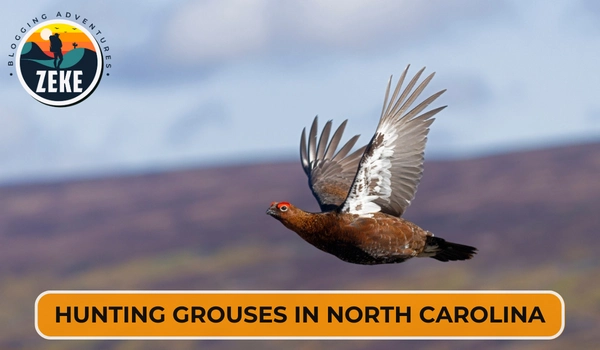
| Species | Dates | Bag Limit |
| Grouse | Oct 16 – Feb 29 | 3 per day |
Pheasant Season
| Species | Dates | Bag Limit |
| Pheasant | Nov 18 – Feb 01 | 3 per day (Male Pheasant only) |
Rail Season
| Species | Dates | Bag Limit |
| Sora & Virginia Rails | Sep 02 – Nov 22 | 15 per day |
| King & Clapper Rails | Sep 02 – Nov 22 | 25 per day |
Duck Season
| Season | Dates | Bag Limit |
| Inland Zone | 19 Oct – 21 Oct | 6 per day |
| Inland Zone | 04 Nov – 25 Nov | 6 per day |
| Inland Zone | 19 Dec – 31 Jan | 6 per day |
| Coastal Zone | 27 Oct – 28 Oct | 6 per day |
| Coastal Zone | 04 Nov – 25 Nov | 6 per day |
| Coastal Zone | 18 Dec – 31 Jan | 6 per day |
Sea Ducks Season
| Species | Species | Bag Limit |
| Sea Ducks | 27 Oct – 28 Oct, 04 Nov – 25 Nov, 18 Dec – 31 Jan | 4 per day |
Tundra Swan Season (Via Permit Only)
| Species | Species | Bag Limit |
| Tundra Swan | Nov 04 – Dec 31 | 1 per season |
Teal Season
| Species | Dates | Bag Limit |
| Teal | Sep 13 – Sep 30 | 6 per day |
Brant Season
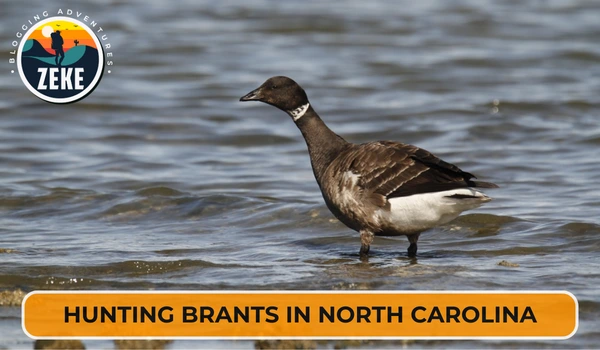
| Species | Dates | Bag Limit |
| Brant | Dec 28 – Jan 31 | 1 per day |
Coot & Merganser Season
| Season | Dates | Bag Limit |
| Inland Zone | 19 Oct – 21 Oct, 04 Nov – 25 Nov, 19 Dec – 31 Jan | Coots: 15 per day Mergansers: 5 per day |
| Coastal Zone | 27 Oct – 28 Oct, 04 Nov – 25 Nov, 18 Dec – 31 Jan | Coots: 15 per day Mergansers: 5 per day |
Goose Season
| Season | Dates | Bag Limit |
| September Canada Goose | 01 Sep – 30 Sep | 15 per day |
| Resident Population Zone | 19 Oct – 28 Oct, 04 Nov – 25 Nov, 18 Dec – 10 Feb | 5 per day |
| Northeast Zone | 28 Dec – 31 Jan | 2 per day |
| Light Geese Regular Season | 10 Oct – 10 Feb | 25 per day |
| Light Geese Conservation Order Season | 12 Feb – 31 Mar | No Limit (Permit Needed) |
Youth & Military Waterfowl Season
| Season | Dates | Bag Limit |
| Youth | 03 Feb & 10 Feb | Same as Regular Season |
| Military/Veterans | 03 Feb & 10 Feb | Same as Regular Season |
Crow Season
| Species | Dates | Bag Limit |
| Crow | Aug 02 – Feb 28, Jun 01 – Jul 31 | No Limit |
Gallinule Season
| Species | Dates | Bag Limit |
| Gallinule | Sep 02 – Nov 22 | 15 per day |
Moorhen Season
| Species | Dates | Bag Limit |
| Moorhen | Sep 02 – Nov 22 | 15 per day |
Woodcock Season
| Species | Dates | Bag Limit |
| Woodcock | Dec 11 – Jan 31 | 3 per day |
Snipe Season
| Species | Dates | Bag Limit |
| Common Snipe | Oct 27 – Feb 28 | 8 per day |
North Carolina Hunting License Information
At age 16, everyone in North Carolina must obtain a hunting license to legally hunt. This includes both residents and non-residents alike; however, there are certain exceptions such as trapping or hunting on one’s own land.
The procedure is simple: just purchase the permit online through the North Carolina Wildlife Resources Commission website or at any authorized location like a sporting goods store, bait shop, etc. You’ll need proof of residency (if applicable) plus your social security number along with information about last year’s hunts.
There are four main licenses available for different types of game: Basic Hunting License (for small game animals), Comprehensive Hunting License (for big game like deer and bear), Sportsman License (includes all privileges from basic and comprehensive licenses plus waterfowl hunting) and Lifetime Hunting Licenses which allows lifetime access to all privileges but only for residents).
Depending on what type of animal you’re after, more permits may be required – such as a Big Game Harvest Report Card for deer/turkey hunters or a Federal Duck Stamp if you plan to hunt ducks/geese. Kindly note that all these documents are valid until June 30th following their issuance date so remember to renew them in time!
In North Carolina, a resident state hunting license costs $25 while a non-resident state hunting license is priced at $100. There are discounts available for senior/veterans/military licenses.
Where to Hunt in North Carolina?
The stunning mountain ranges and abundant wildlife in the western region of North Carolina make it an ideal destination for hunters. From black bears to white-tailed deer, Pisgah National Forest, Nantahala National Forest, and Great Smoky Mountains National Park all offer excellent hunting opportunities.
Heading east into the Piedmont region, you’ll find a mix of different prey including waterfowl, small game, and deer. Lake Norman State Park and Uwharrie National Forest are just two popular spots that allow for great hunting experiences here.
The Tarheel State has the coastal plain area in Eastern North Carolina with its vast wetlands and marshes making this perfect terrain for waterfowl hunting but also offering options to hunt turkey or deer like at Alligator River Wildlife Refuge or Croatan National Forest.
For those who don’t want to miss out on any opportunity, there are plenty more public game lands spread throughout NC managed by the Wildlife Resources Commission where almost any kind of game can be hunted as well.
Public Hunting Places in North Carolina
DuPont State Forest
DuPont State Forest is a hunter’s paradise, with its rolling hills, dense forests, and clear streams providing ample opportunity for any level of experience.
From white-tailed deer to wild turkeys, black bears to bobcats – there’s no shortage of game here. Plus, the 12,000 acres of land offer plenty of spots to choose from when you’re scouting out that perfect spot.
But it’s not just about the abundant wildlife in DuPont; this forest also stands apart thanks to its commitment to conservation and sustainability. The management team works hard to maintain an optimal environment for both animals and hunters alike by carefully managing hunting seasons and enforcing regulations so everyone can enjoy their time spent outdoors safely!
Pisgah National Forest
For those out hunting in North Carolina, Pisgah National Forest in Western North Carolina is a true gem. Spanning an expansive 500,000 acres of lush and varied terrain, this forest offers something to suit all types of hunters.
From rolling hills to steep mountainsides, the diverse landscape provides plenty of opportunity for deer hunting with both rifle and bow. Plus, there are also abundant game lands and open access areas that cater to small game like squirrels and rabbits. For those seeking a more challenging venture into nature, backcountry hunting awaits – just make sure you have permission before setting up camp!
Nantahala National Forest
With over 500,000 acres of pristine land, Nantahala National Forest is a hunter’s haven. This expansive area offers a variety of game including deer, turkey, bear, and small critters like squirrels and rabbits. It’s also a great spot for bird hunting – with several species taking refuge in the forest.
Not only does this outdoor playground offer diverse wildlife to pursue, but it has stunning scenery as well. As you wander through the forested trails, you’ll be surrounded by lush greenery and majestic mountain views that will take your breath away.
Before heading out on your adventure though, make sure to do some research into the state regulations regarding hunting permits or licenses – safety is key when it comes to protecting both yourself and the animals around you!.
Equip yourself with suitable clothing such as boots for navigating varied terrain plus whatever weapon works best for which animal; rifle or bow.
Lake Norman State Park
Lake Norman State Park offers the perfect setting for a hunting adventure. With over 30 miles of trails and 1,800 acres full of wildlife like deer, turkey, rabbit, squirrels, and even bears – you’ll have plenty of opportunities to track down your desired game.
Plus there are designated hunting areas with specific rules and regulations that should be adhered to at all times; safety must always come first!
Once you’ve got your sights set on an area within the park, make sure to bring along a friend so that you can both enjoy this unique experience together safely.
Uwharrie National Forest
Uwharrie National Forest, located in central North Carolina, is an amazing 50,000-acre wilderness. It’s a hunter’s paradise with its rolling hills, dense forests, and meandering streams providing thrilling hunting opportunities for all skill levels. Whether you’re after white-tailed deer, wild turkey, or small game like squirrels and rabbits – Uwharrie has it all.
But there’s more to the forest than just hunting; hikers can explore miles of trails while campers can pitch their tents near shimmering lakes and rivers. Even if you don’t hunt – fishing is also available here! Plus numerous other outdoor activities are waiting to be enjoyed by friends & family alike.
Before setting off on your adventure though, make sure you get the necessary permits from the North Carolina Wildlife Resources Commission as well as familiarize yourself with local regulations so that everyone stays safe during this exciting experience.
Private Hunting Places in North Carolina
If you’re looking for an exclusive experience, there are many private hunting places throughout NC that provide access to prime grounds with services such as lodging and guided hunts.
Do some research beforehand so that you can familiarize yourself with the area – be aware of any potential hazards or risks present too. But most importantly, practice safe techniques while respecting both the environment and wildlife around you at all times!
It’s essential to know the rules when hunting on private land in North Carolina. Make sure you get all necessary permits and licenses before going out on your expedition. Also, ensure that you get consent from the property owner before stepping foot onto their terrain so that your hunting adventure goes without a hitch.
